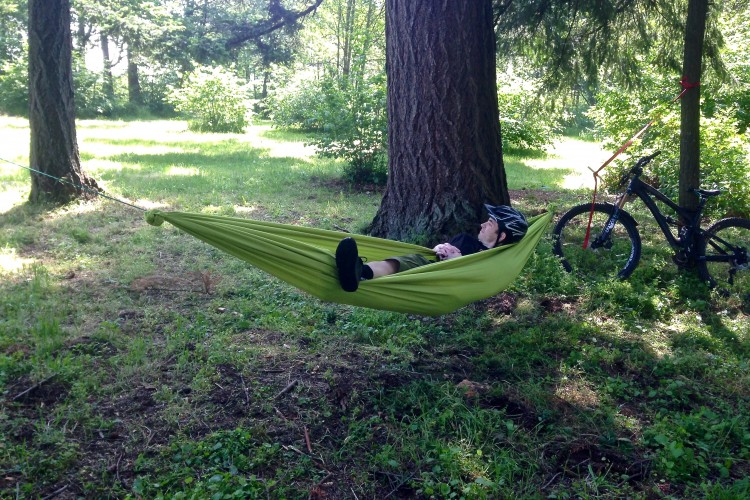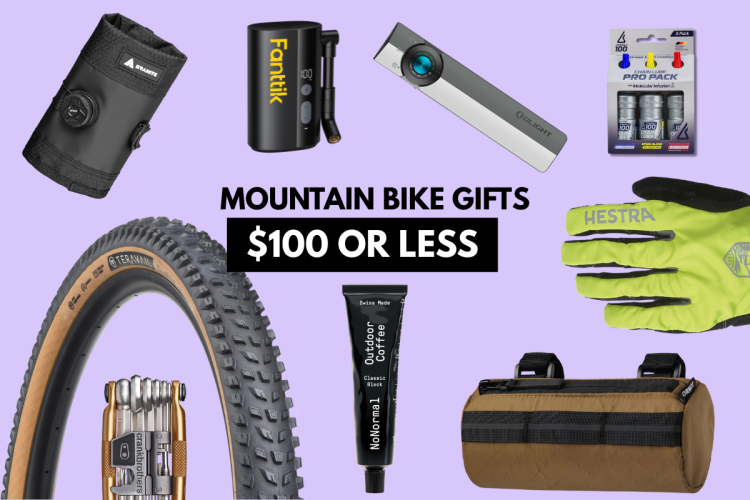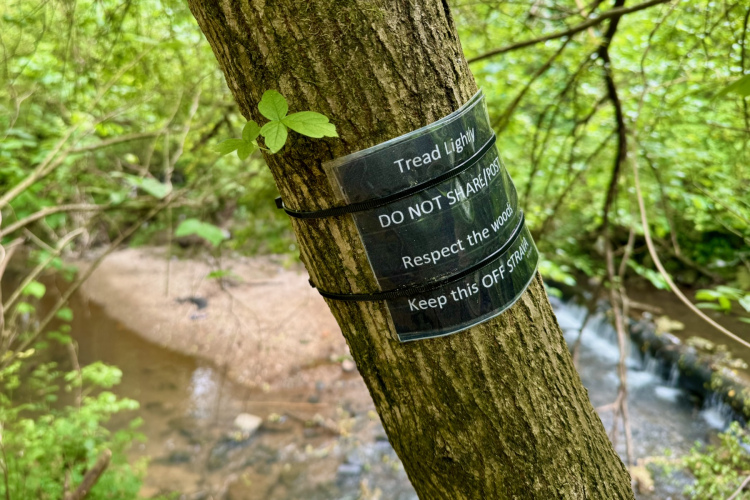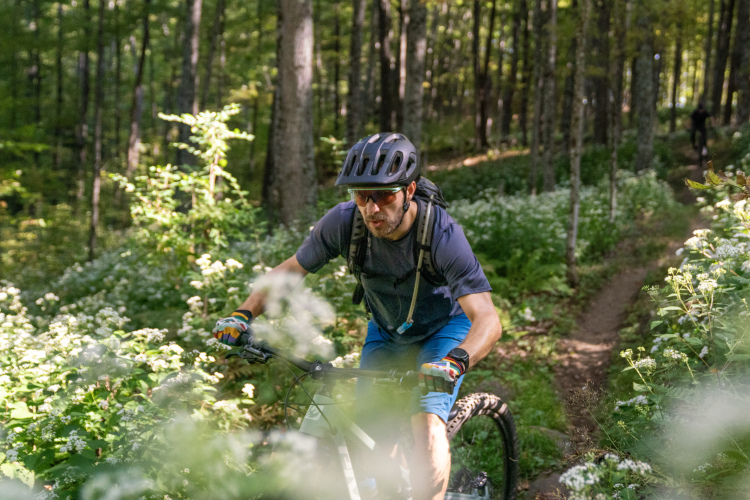You’ve spent months reading reviews online, ridden all kinds of bikes at demo days, and saved your pennies. After much deliberation and fretting you’ve finally pulled the trigger on that new bike. To make room–or to make some more funds available–it’s time to pawn that old scrap heap off to some unsuspecting sucker. Uh, I mean, it’s time to sell your old bike.
Here are some tips to make the process as easy as possible.
Be realistic about what your bike is worth
All too often, I see people setting ridiculous prices for their used bikes. It doesn’t matter that your 1999 Cannondale Super V retailed for $2,000 when it was new. And the fact that you recently replaced the grips and chain doesn’t change the reality that your bike is old. If your bike was a person, it wouldn’t even ride itself, it would be too busy trying to get its drivers license. You are never, ever, ever, going to get $1,500 for that bike. Or even a thousand dollars for that matter.

You need to take into account the age of your bike as well as the condition of the frame and its components. If your bike is more than a few years old and has actually been used like a mountain bike should be, you’re not going to get very much for it. Just accept that and you’ll save yourself a lot of frustration. If you can’t get past your beloved Cannondale only being worth a few hundred bucks (at most), keep it in your stable. Or better yet, give it to someone just getting into the sport.
For a rough guide to price your bike, the Bicycle Blue Book is available, although I think their prices are a bit on the high side. Another good resource is to check eBay and see what similar bikes are selling for.
Get over your bike
You and that Cannondale probably had a bunch of great rides together. It never let you down, except that one time you taco’d the front wheel and had to walk 8 miles back to the car. Man, that was a ride. Then there was that summer you totally dominated the local race series. So many podiums. So many memories.
And nobody gives a shit. Just because you have an emotional connection with your bike doesn’t mean anyone else will. From a buyer’s perspective, sentimental value is irrelevant. Soon enough, it won’t be your bike anymore, it’ll be making new memories with someone else.
This is related to my first point, but it needed to be said.
Be honest about the condition of your bike
One man’s “tiny ding” is another’s “huge dent,” so be transparent about the condition of your bike and components. It’s better for you in the long run, especially if you end up selling your bike on eBay. eBay gives the buyer a lot of power, and will more than likely side with them if there is any dispute. You could be out your money from the sale as well as the item itself (yes, seriously).

When you’re getting your bike ready to sell, go over it with a fine tooth comb. Check all the welds, but pay particular attention to the area around the bottom bracket and head tube. Take the rear wheel off and check around the hard-to-see areas near the dropouts, chain stays, and seat stays.

If you’re selling a carbon fiber frame, it’s still a good idea to check these high stress areas. Whatever the material, if you do discover any cracks, don’t sell it! Do the right thing and trash the frame.
Take LOTS of photos
The best way to showcase the condition of your bike is by taking lots of photos. Your smartphone’s camera will suffice as long as you have good light. Please do everyone a favor, and LOOK at the pictures before you post them. Nobody wants to see a blurry pic of a derailleur. Digital photos are free, people–take another one.

If you want to get a little fancier, you can stage a little photoshoot for your bike–one last hurrah together before you send it on to its next home. Find a nice place in the woods, or at least a clean spot in the basement, and go to town. Be sure to highlight any areas where there are scratches, nicks, gouges, etc. Use a coin to show the relative size of any damaged areas. Pro tip: using a shallow depth of field is a good technique for showcasing components.

Get photos of the entire bike–drive side facing the camera, please–as well as all the components:
- Fork
- Shock (if applicable)
- Wheels and tires
- Cockpit (bars, grips, stem, saddle, post)
- Brakes and levers
- Shifters
- Derailleurs
- Cranks
Remember, the more expensive the bike, the more important the photos. While some quick phone snaps will work for that ’99 Super V, if you’re trying to sell last year’s Pivot Mach 6, take the time to dial in your photos. I’ve even bribed photographer friends with beer to shoot really high end bikes.
Here are a couple articles on Singletracks with tips on how to up your photo game:
Give as much detail as possible in your post
Alright, you’ve come to grips with the fact that you won’t get out of your bike what you put into it, you’ve inspected all the nooks and crannies, and you’ve got a memory card full of sick pics. It’s time to write a description of your bike.
There are numerous ways to go about writing a description from a “just the facts, ma’am” style, to humorous–the choice is yours. A thorough description in conjunction with detailed photos will head off a lot of potential questions from buyers. Whatever approach you take, just be sure to include at least the following information:
- Brand
- Year
- Size
- Price (include whether you will take “best offers” or are open to trades)
- Condition of the frame
- List components along with their condition
- Any maintenance recently performed
- Any maintenance currently needed
Decide where to post your bike for sale
There is certainly no shortage of options for where to offload your used gear, each with its own downsides. Probably the biggest and most professional option is eBay. Both buyers and sellers are provided with some protections, but eBay is going to take a sizable cut from your sale. Combine that with fees from PayPal, and the amount you take home will be considerably less than the item’s final value. You’re also likely going to have to ship the bike, which is a pain in the ass. Even if the buyer is paying for it, you still need to source a box, pack the thing up, and take it to get shipped.
Craigslist is free to use, and I’ve generally had good experiences selling through their site. You’re usually going to be selling to someone local, taking shipping out of the equation. However, you’ll probably get a bunch of low ballers or offers for weird trades. It’s best to just ignore those emails.
Apart from eBay and Craigslist, there are also forums or buy/sell sections on mountain bike websites (like Singletracks’), local bike clubs, or local Facebook groups. It’s best to post on multiple sites so your bike will reach as many potential buyers as possible.
Caveat venditor
You’ve probably heard the Latin phrase, “caveat emptor,” which means “buyer beware.” The flip side to that is “caveat venditor,” or “seller beware.” However you decide to sell your old bike, be smart about it, especially if you’re meeting someone face-to-face.

Don’t meet anyone you don’t already know at your home. Instead, choose a public place, even a police station parking lot, to make the transaction. There seems to be a lot of coverage of Craigslist robberies recently where the seller shows up to meet the buyer, and ends up getting robbed. And don’t let anyone test ride the bike unless you’ve got the cash in your hand. They may just keep “test riding” your bike right on down the road.
If you’re getting a weird vibe from someone, like an email at 2am saying they want to come check the bike out now, trust your instincts and politely decline. Or better yet, just ignore them.
Final thoughts
Selling anything online can be an involved process, but it doesn’t have to be painful. Set a realistic price, be truthful about the condition, take great photos, post that thing everywhere, and wait for the cash to come rolling in.











4 Comments
Oct 12, 2015
Since you can never get out of a used bike what it's really worth, I've taken to just hanging onto bikes that I think may be of use, or that fill a whole in my quiver that another bike doesn't. However, at some point if you hang on to a bike for TOO long and you never use, it's only going to keep depreciating, even if you aren't riding it. So, you really have to strike a balance between keeping a bike because you won't be able to get enough $$ out of it, and selling it if you think you might use it at some point.
Also, as for what website to sell it on, I think it really depends on where you're located. Both bikes of mine that I've sold, I've moved via a local buy/sell page on Facebook. This ensured that I would easily be able to meet with a local buyer, and also reduced having to deal with off-topic emails via craigslist and unrealistic offers. However, I live in a small Colorado mountain town where almost everybody mountain bikes at least occasionally--so selling a bike here is pretty easy to do.
Finally, I'd add that it's crucial to think of the time of year. In general, you'll be able to sell your bike faster and for a bit more money if you try to move it in the spring/summer, vs the fall/winter.
Thanks for writing this awesome guide, Aaron! Right on the money!
Oct 12, 2015
Good point about the season, that's definitely something to consider. For instance, fall isn't a good time to sell a bike around here as a lot of folks are getting ready for cross season. Late winter, early spring is better.
Another thing I should have added, donating a bike to a charity is another way to get rid of it and feel good about it! We've got Sopo Bikes http://sopobikes.org/ here among others. That's where I take a lot of my gear that still has some life left in it.
Oct 15, 2015
An article on buying a bike online wouldn't go amiss either. I've done that a couple of times (though probably not again).
Oct 15, 2015